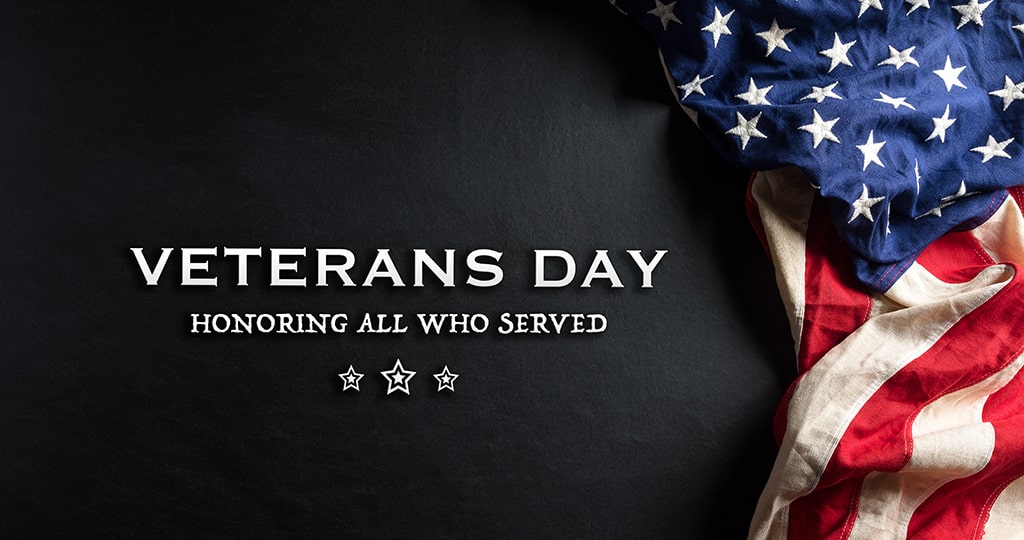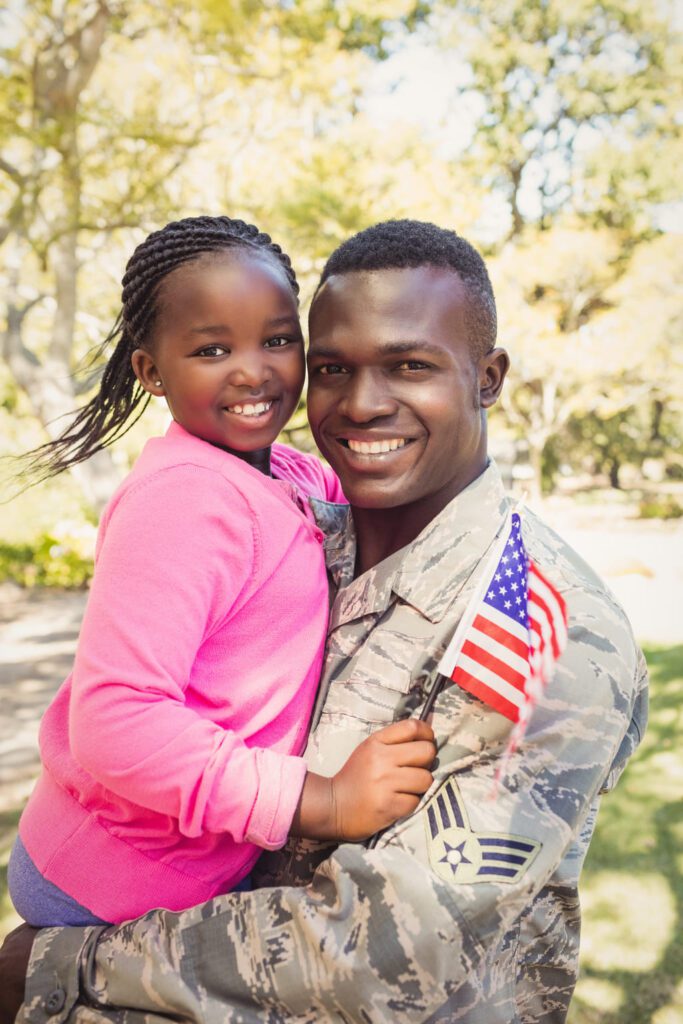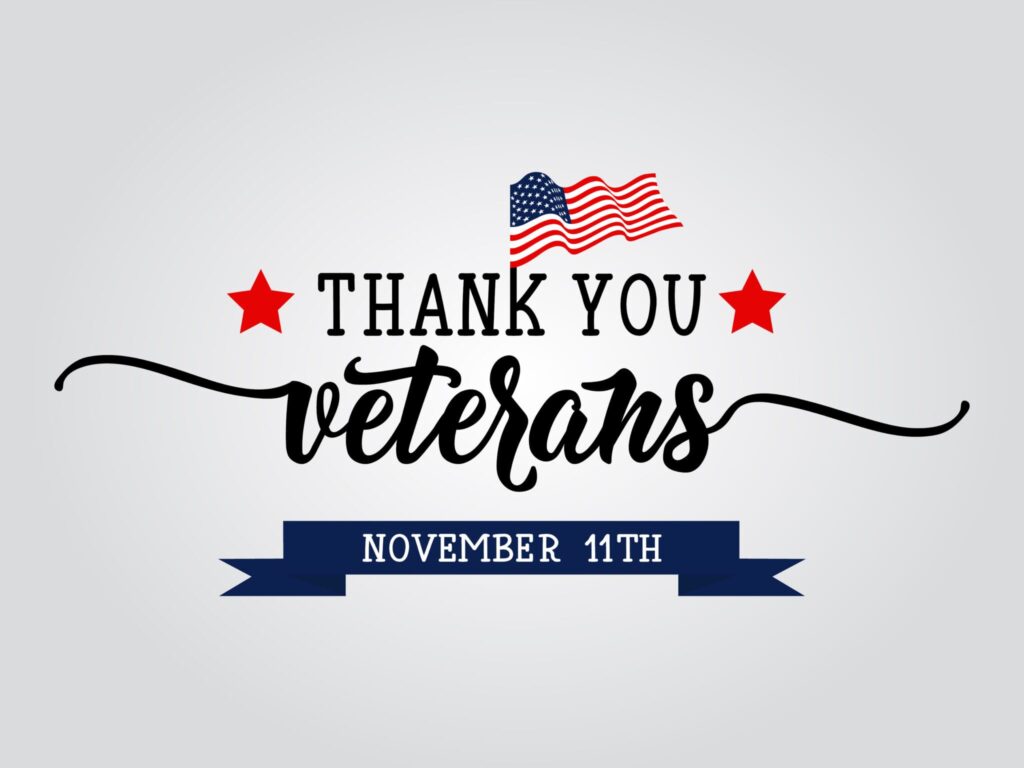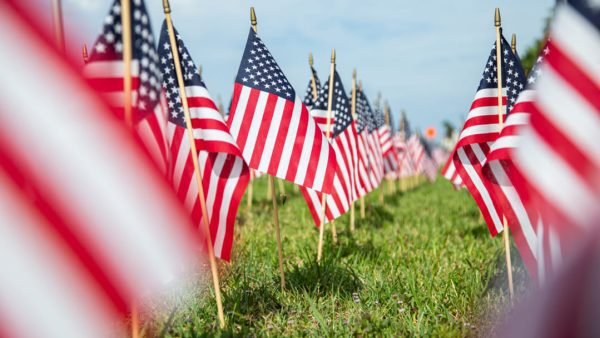Too often, holidays pass without much consideration for the origins or significance of the date being recognized. Veterans Day is no exception.
At VA Claims Insider, we’re 100% focused on veterans every day of the year, but on Veterans Day 2023, we feel it’s important to take time to honor those who served and understand how this day of observance was established.
Also, be sure to check out our 2023 Guide to the BEST Veterans Day Freebies!

When is Veterans Day 2023?
Veterans Day is always celebrated on November 11. Veterans Day 2023 falls on a Saturday. Many people don’t know how and why November 11 came to be the day on which Veterans Day is always observed. Below we share that bit of history.
What is Veterans Day and How Did it Begin?
Veterans Day is a day for us to celebrate America’s veterans for their patriotism, bravery, love of country, and willingness to serve and sacrifice for the common good. But Veterans Day wasn’t always a day designated to honor all veterans; its origins date back to World War I, and the day was originally associated with that war.
The History of Veterans Day
World War 1 officially ended with the signing of the Treaty of Versailles. But the fighting of “The Great War” had ended seven months earlier when the Allied nations and Germany agreed to a truce. That truce began on the eleventh hour of the eleventh day of the eleventh month. November 11, 1918, thus became known as “Armistice Day,” a day of truce, and President Woodrow Wilson soon proclaimed November 11 to be an annual commemoration of the armistice.

Then, in 1946, a Navy World War II veteran from Birmingham, AL, named Raymond Weeks began petitioning leaders (including General Dwight D. Eisenhower) to widen the scope of Armistice Day to celebrate all American veterans—not only those who fought in WWI.
In 1954, eight years after Navy Veteran Raymond Weeks began his petition, his efforts were rewarded when Congress officially changed “Armistice Day” to “Veterans Day”— honoring all American veterans who have served our nation.
Weeks became known as the “Father of Veterans Day,” and in 1982, President Ronald Reagan awarded him the Presidential Citizenship Medal for his contributions to the veteran community. Reagan acknowledged that “for more than 50 years, Mr. Weeks has exemplified the finest tradition of American voluntarism by his unselfish service to his country.”
What is the Difference Between Veterans Day and Memorial Day?
Veterans Day celebrates and honors the service of all American veterans, while Memorial Day is a day that memorializes and honors specifically those service members who died while serving our country.

Is Veterans Day a Federal Holiday?
Yes, Veterans Day is one of eleven federal holidays. All non-essential federal government offices are closed on Veterans Day.
Some private companies close on Veterans Day, but most U.S. employees don’t get the day off from work. According to the Bureau of Labor Statistics, Veterans Day is a paid holiday for only 19% of American workers. Just 11% of private-sector workers get the day off.
Only four states (Iowa, Massachusetts, New Hampshire, and Oregon) require private employers to provide time off to veterans on Veterans Day. Employers are allowed to choose whether to offer paid or unpaid time off.
Special Promotions for Veterans Day
Many businesses and restaurants offer special promotions and free items or meals to veterans on Veterans Day to acknowledge and recognize their service. Be sure to check out VA Claims Insider’s list of the BEST VETERANS DAY FREEBIES in 2023
What Can We Do For Veterans on Veterans Day?
Veterans Day is a great day to renew your commitment to veterans, and we have compiled a list of supportive resources for veterans that we hope you’ll use and share as well.
Helping Veterans Get the VA Rating and Compensation They Deserve
Almost nothing honors—and changes—a veteran’s life more than getting the highest possible VA rating and the full compensation they deserve. At VA Claims Insider, this is our number one mission.

We help veterans do this through many avenues, providing education and resources that veterans can use to find benefits and win claims:
- See the Blog for hundreds of educational articles, testimonials, and guides—frequently updated with the latest information veterans need about their VA claims, ratings, and benefits.
- Check out the YouTube channel for hundreds of videos on crucial VA claim topics, including all our Facebook Lives
- Facebook Lives every Wednesday at 11 am Central, sharing the latest intel on what’s working for winning VA claims, with Q&A. Join our Facebook Group so you get notified of all upcoming LIVES!
- Dozens of eBooks, such as the popular Top 25 Tips for 100% Disabled Veterans
- #1 Amazon bestseller You Deserve It: The Definitive Guide to Getting the Veteran Benefits You’ve Earned. VACI Claim Insider founder and author Brian Reese explains that he wrote this book to be “the book I wished someone had written for me…a year before I took off my uniform, if only someone had dropped this on my desk and said ‘hey man, here’s your playbook.’” It details step-by-step actions for veterans to get the benefits they deserve for their service: federal, state, nonprofit and for-profit resources for veterans and their families, from health to education to real estate and more.
- Free Discovery Call with one of our team members to help you learn how your claim can be improved, and explore what it will take for you to fill any gaps causing denials or low ratings.
- Premium services that include expert one-on-one coaching through the VA disability claim process, free to start with no fee unless and until the veteran successfully increases their disability rating. While some veterans can use educational resources to figure it out on their own, many want to fast-track the process with the support of a coach and a community. ELITE members also get connections to medical evidence through a network of independent medical professionals who know how to speak the VA’s language, discounts on mental health evaluations, and more. (Click here to apply.)
A Great Day to Commit to Supporting Veterans’ Mental Health
Nearly every veteran we speak to suffers from mental health symptoms—whether they realize it or not.
There are 31 ratable mental health conditions under the law. The five most common are PTSD, Adjustment Disorder, Depression, Anxiety, and Somatic Symptom Disorder.
Here are our top resources related to winning claims for PTSD and Depression
- Mental health conditions are usually “high-value” claims, meaning they are more likely to get rated at 30% or higher on their own. In addition, mental health conditions are usually easy VA disability claims to get approved.
- 44.2% of veterans with a service-connected mental health condition are rated at 70% or higher; the average VA rating for mental health is 70%. According to the most recent VBA report to Congress, 92.1% of disabled veterans rated for a mental health condition are rated at 30% or higher.
- Many service-connected physical conditions can cause or aggravate mental health conditions and vice versa. Veterans already rated for one condition may consider filing a claim for a mental health condition if a nexus can be proven between the condition and a mental health disorder. Post-Traumatic Stress Disorder is an easy claim to get approved if you have a medical diagnosis of PTSD in a medical record and have a valid PTSD stressor event that can be verified.
- Depression is common among veterans, yet VA claims for depression are complex. You must establish that your depression directly stems from service. The ideal way to prove service connection for depression would be by having evidence in your active duty service records, but not many veterans have that evidence in their service records. Due to the culture of the military, many active-duty personnel hide their depression and other mental health issues from their peers and leaders.
Depression, like many other mental health conditions, can also be filed as secondary to an already service-connected disability. - When service records don’t document depression, personal statements from the veteran and buddy letters from family members or others close to the veteran can be instrumental. A veteran also needs to show that he or she is currently diagnosed with depression.

Happy Veterans Day 2023
There are many other ways to honor veterans on this important day. If you know a veteran, it might be a good day to thank them for their service and even to ask if you can do anything to support them.
Happy Veterans Day 2023, and we hope this Veterans Day finds you and your family healthy. We want to THANK ALL VETERANS and their families for their service to our country!
You DESERVE a HIGHER VA rating.
WE CAN HELP.
Take advantage of a FREE VA Claim Discovery Call with an experienced Team Member. Learn what you’ve been missing so you can FINALLY get the disability rating and compensation you’ve earned for your service.
MAKE SURE YOU GET ALL THE BENEFITS YOU DESERVE
Regardless of what state you live in, it’s important that you pursue the monthly compensation payments due to you for disabilities connected to your military service.
Most veterans are underrated for their disabilities and therefore not getting the compensation they deserve. At VA Claims Insider, we help veterans understand and take control of the claims process so they can get the rating and compensation they’re owed by law.
Our process takes the guesswork out of filing a VA disability claim and supports you every step of the way in building a fully-developed claim (FDC)—so you can increase your rating in less time!
If you’ve filed your VA disability claim and have been denied or have received a low rating – or you’re not sure how to get started – reach out to us for a FREE VA Claim Discovery Call, so you can FINALLY get the disability rating and compensation you deserve. We’ve supported more than 25,000 veterans to win their claims. NOW IT’S YOUR TURN.
What Veterans Say About VA Claims Insider
“I didn’t know anything when it came to the claims process. Gathering military records, communicating with the VA, and uploading documents is a lot of work. But I received guidance and support from my coach and the VACI community of veterans. And after years with a VA rating of 20%, I went from a 20% to 90% disability rating in six months.” – Ken Kachold, retired Air Force Senior Master Sergeant
“I cannot say enough good things about VA Insider—they literally have changed my life! To any veteran with health or mental issues, not only would I recommend them, I would say run to them! They are the best thing I have ever found on the Internet and one of the best things to happen in my life!! Don’t wait, veterans!!” – Chuck Dobbins
“This is the second time that VA Claims Insider has helped me. A couple years ago they helped me go from a 30% rating to a 80% rating in just a few short months. This time I was able to increase my rating to 90%. They offer a tremendous amount of information. I am thankful for running across this group, because I had nearly given up after 20 years of fighting the VA giant.” – Rich Fraser



